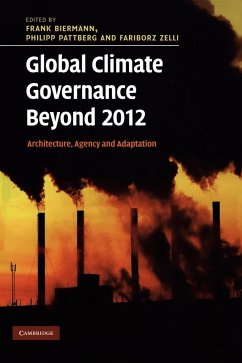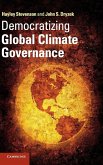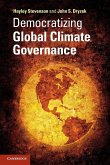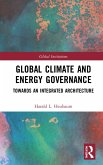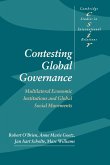Global Climate Governance Beyond 2012
Architecture, Agency and Adaptation
Herausgeber: Biermann, Frank; Zelli, Fariborz; Pattberg, Philipp
Global Climate Governance Beyond 2012
Architecture, Agency and Adaptation
Herausgeber: Biermann, Frank; Zelli, Fariborz; Pattberg, Philipp
- Gebundenes Buch
- Merkliste
- Auf die Merkliste
- Bewerten Bewerten
- Teilen
- Produkt teilen
- Produkterinnerung
- Produkterinnerung
A cutting-edge analysis of the key issues and policy options facing future global climate governance, written by leading world experts.
Andere Kunden interessierten sich auch für
![Small Arms Survey 2012 Small Arms Survey 2012]() Small Arms Survey 2012133,99 €
Small Arms Survey 2012133,99 €![Democratizing Global Climate Governance Democratizing Global Climate Governance]() Hayley StevensonDemocratizing Global Climate Governance91,99 €
Hayley StevensonDemocratizing Global Climate Governance91,99 €![Democratizing Global Climate Governance Democratizing Global Climate Governance]() Hayley StevensonDemocratizing Global Climate Governance32,99 €
Hayley StevensonDemocratizing Global Climate Governance32,99 €![Global Climate and Energy Governance Global Climate and Energy Governance]() Harald L HeubaumGlobal Climate and Energy Governance165,99 €
Harald L HeubaumGlobal Climate and Energy Governance165,99 €![Contesting Global Governance Contesting Global Governance]() Robert O'BrienContesting Global Governance27,99 €
Robert O'BrienContesting Global Governance27,99 €![Global Governance in a World of Change Global Governance in a World of Change]() Global Governance in a World of Change36,99 €
Global Governance in a World of Change36,99 €![Carbon Markets in a Climate-Changing Capitalism Carbon Markets in a Climate-Changing Capitalism]() Gareth BryantCarbon Markets in a Climate-Changing Capitalism100,99 €
Gareth BryantCarbon Markets in a Climate-Changing Capitalism100,99 €-
-
-
A cutting-edge analysis of the key issues and policy options facing future global climate governance, written by leading world experts.
Hinweis: Dieser Artikel kann nur an eine deutsche Lieferadresse ausgeliefert werden.
Hinweis: Dieser Artikel kann nur an eine deutsche Lieferadresse ausgeliefert werden.
Produktdetails
- Produktdetails
- Verlag: Cambridge University Press
- Seitenzahl: 350
- Erscheinungstermin: 18. August 2010
- Englisch
- Abmessung: 260mm x 183mm x 23mm
- Gewicht: 854g
- ISBN-13: 9780521190114
- ISBN-10: 0521190118
- Artikelnr.: 28244937
- Herstellerkennzeichnung
- Libri GmbH
- Europaallee 1
- 36244 Bad Hersfeld
- gpsr@libri.de
- Verlag: Cambridge University Press
- Seitenzahl: 350
- Erscheinungstermin: 18. August 2010
- Englisch
- Abmessung: 260mm x 183mm x 23mm
- Gewicht: 854g
- ISBN-13: 9780521190114
- ISBN-10: 0521190118
- Artikelnr.: 28244937
- Herstellerkennzeichnung
- Libri GmbH
- Europaallee 1
- 36244 Bad Hersfeld
- gpsr@libri.de
List of contributors; Preface; List of abbreviations; 1. Global climate
governance beyond 2010: an introduction Frank Biermann, Philipp Pattberg
and Fariborz Zelli; Part I. Architecture: 2. The architecture of global
climate governance: setting the stage Frank Biermann, Fariborz Zelli,
Philipp Pattberg and Harro van Asselt; 3. The consequences of a fragmented
climate change governance architecture: a policy appraisal Fariborz Zelli,
Frank Biermann, Philipp Pattberg and Harro van Asselt; 4. Environmental
effectiveness and economic consequences of fragmented versus universal
regimes: what can we learn from model studies? Andries Hof, Michel den
Elzen and Detlef van Vuuren; 5. Developing the international carbon market
beyond 2012: options and the cost of delay Christian Flachsland, Robert
Marschinski, Ottmar Edenhofer, Marian Leimbach and Lavinia Baumstark; 6.
The overlap between the UN climate regime and the World Trade Organization:
lessons for climate governance beyond 2012 Fariborz Zelli and Harro van
Asselt; 7. An architecture for long-term climate change: North-South
cooperation based on equity and common but differentiated responsibilities
Harald Winkler; 8. Shaping the architecture of future climate governance:
perspectives from the South Manish Kumar Shrivastava and Nitu Goel; Part
II. Agency: 9. Agency in global climate governance: setting the stage
Philipp Pattberg and Johannes Stripple; 10. The role and relevance of
networked climate governance Philipp Pattberg; 11. Carbon market governance
beyond the public-private divide Johannes Stripple and Eva Lövbrand; 12. A
staged sectoral approach for climate mitigation Michel den Elzen, Andries
Hof, Jasper van Vliet and Paul Lucas; 13. Technological change and the role
of non-state actors Knut H. Alfsen, Gunnar S. Eskeland and Kristin
Linnerud; Part III. Adaptation: 14. Global adaptation governance: setting
the stage Frank Biermann and Ingrid Boas; 15. Costs, benefits and
interlinkages between adaptation and mitigation Andries Hof, Kelly de
Bruin, Rob Dellink, Michel den Elzen and Detlef van Vuuren; 16. Global
adaptation governance: the case of protecting climate refugees Frank
Biermann and Ingrid Boas; 17. Global adaptation governance beyond 2012:
developing country perspectives Jessica Ayers, Mozaharul Alam and Saleemul
Huq; 18. Shaping future adaptation governance: perspectives from the
poorest of the poor Anne Jerneck and Lennart Olsson; 19. Conclusions:
options for effective climate governance beyond 2012 Frank Biermann,
Philipp Pattberg and Fariborz Zelli; Index.
governance beyond 2010: an introduction Frank Biermann, Philipp Pattberg
and Fariborz Zelli; Part I. Architecture: 2. The architecture of global
climate governance: setting the stage Frank Biermann, Fariborz Zelli,
Philipp Pattberg and Harro van Asselt; 3. The consequences of a fragmented
climate change governance architecture: a policy appraisal Fariborz Zelli,
Frank Biermann, Philipp Pattberg and Harro van Asselt; 4. Environmental
effectiveness and economic consequences of fragmented versus universal
regimes: what can we learn from model studies? Andries Hof, Michel den
Elzen and Detlef van Vuuren; 5. Developing the international carbon market
beyond 2012: options and the cost of delay Christian Flachsland, Robert
Marschinski, Ottmar Edenhofer, Marian Leimbach and Lavinia Baumstark; 6.
The overlap between the UN climate regime and the World Trade Organization:
lessons for climate governance beyond 2012 Fariborz Zelli and Harro van
Asselt; 7. An architecture for long-term climate change: North-South
cooperation based on equity and common but differentiated responsibilities
Harald Winkler; 8. Shaping the architecture of future climate governance:
perspectives from the South Manish Kumar Shrivastava and Nitu Goel; Part
II. Agency: 9. Agency in global climate governance: setting the stage
Philipp Pattberg and Johannes Stripple; 10. The role and relevance of
networked climate governance Philipp Pattberg; 11. Carbon market governance
beyond the public-private divide Johannes Stripple and Eva Lövbrand; 12. A
staged sectoral approach for climate mitigation Michel den Elzen, Andries
Hof, Jasper van Vliet and Paul Lucas; 13. Technological change and the role
of non-state actors Knut H. Alfsen, Gunnar S. Eskeland and Kristin
Linnerud; Part III. Adaptation: 14. Global adaptation governance: setting
the stage Frank Biermann and Ingrid Boas; 15. Costs, benefits and
interlinkages between adaptation and mitigation Andries Hof, Kelly de
Bruin, Rob Dellink, Michel den Elzen and Detlef van Vuuren; 16. Global
adaptation governance: the case of protecting climate refugees Frank
Biermann and Ingrid Boas; 17. Global adaptation governance beyond 2012:
developing country perspectives Jessica Ayers, Mozaharul Alam and Saleemul
Huq; 18. Shaping future adaptation governance: perspectives from the
poorest of the poor Anne Jerneck and Lennart Olsson; 19. Conclusions:
options for effective climate governance beyond 2012 Frank Biermann,
Philipp Pattberg and Fariborz Zelli; Index.
List of contributors; Preface; List of abbreviations; 1. Global climate
governance beyond 2010: an introduction Frank Biermann, Philipp Pattberg
and Fariborz Zelli; Part I. Architecture: 2. The architecture of global
climate governance: setting the stage Frank Biermann, Fariborz Zelli,
Philipp Pattberg and Harro van Asselt; 3. The consequences of a fragmented
climate change governance architecture: a policy appraisal Fariborz Zelli,
Frank Biermann, Philipp Pattberg and Harro van Asselt; 4. Environmental
effectiveness and economic consequences of fragmented versus universal
regimes: what can we learn from model studies? Andries Hof, Michel den
Elzen and Detlef van Vuuren; 5. Developing the international carbon market
beyond 2012: options and the cost of delay Christian Flachsland, Robert
Marschinski, Ottmar Edenhofer, Marian Leimbach and Lavinia Baumstark; 6.
The overlap between the UN climate regime and the World Trade Organization:
lessons for climate governance beyond 2012 Fariborz Zelli and Harro van
Asselt; 7. An architecture for long-term climate change: North-South
cooperation based on equity and common but differentiated responsibilities
Harald Winkler; 8. Shaping the architecture of future climate governance:
perspectives from the South Manish Kumar Shrivastava and Nitu Goel; Part
II. Agency: 9. Agency in global climate governance: setting the stage
Philipp Pattberg and Johannes Stripple; 10. The role and relevance of
networked climate governance Philipp Pattberg; 11. Carbon market governance
beyond the public-private divide Johannes Stripple and Eva Lövbrand; 12. A
staged sectoral approach for climate mitigation Michel den Elzen, Andries
Hof, Jasper van Vliet and Paul Lucas; 13. Technological change and the role
of non-state actors Knut H. Alfsen, Gunnar S. Eskeland and Kristin
Linnerud; Part III. Adaptation: 14. Global adaptation governance: setting
the stage Frank Biermann and Ingrid Boas; 15. Costs, benefits and
interlinkages between adaptation and mitigation Andries Hof, Kelly de
Bruin, Rob Dellink, Michel den Elzen and Detlef van Vuuren; 16. Global
adaptation governance: the case of protecting climate refugees Frank
Biermann and Ingrid Boas; 17. Global adaptation governance beyond 2012:
developing country perspectives Jessica Ayers, Mozaharul Alam and Saleemul
Huq; 18. Shaping future adaptation governance: perspectives from the
poorest of the poor Anne Jerneck and Lennart Olsson; 19. Conclusions:
options for effective climate governance beyond 2012 Frank Biermann,
Philipp Pattberg and Fariborz Zelli; Index.
governance beyond 2010: an introduction Frank Biermann, Philipp Pattberg
and Fariborz Zelli; Part I. Architecture: 2. The architecture of global
climate governance: setting the stage Frank Biermann, Fariborz Zelli,
Philipp Pattberg and Harro van Asselt; 3. The consequences of a fragmented
climate change governance architecture: a policy appraisal Fariborz Zelli,
Frank Biermann, Philipp Pattberg and Harro van Asselt; 4. Environmental
effectiveness and economic consequences of fragmented versus universal
regimes: what can we learn from model studies? Andries Hof, Michel den
Elzen and Detlef van Vuuren; 5. Developing the international carbon market
beyond 2012: options and the cost of delay Christian Flachsland, Robert
Marschinski, Ottmar Edenhofer, Marian Leimbach and Lavinia Baumstark; 6.
The overlap between the UN climate regime and the World Trade Organization:
lessons for climate governance beyond 2012 Fariborz Zelli and Harro van
Asselt; 7. An architecture for long-term climate change: North-South
cooperation based on equity and common but differentiated responsibilities
Harald Winkler; 8. Shaping the architecture of future climate governance:
perspectives from the South Manish Kumar Shrivastava and Nitu Goel; Part
II. Agency: 9. Agency in global climate governance: setting the stage
Philipp Pattberg and Johannes Stripple; 10. The role and relevance of
networked climate governance Philipp Pattberg; 11. Carbon market governance
beyond the public-private divide Johannes Stripple and Eva Lövbrand; 12. A
staged sectoral approach for climate mitigation Michel den Elzen, Andries
Hof, Jasper van Vliet and Paul Lucas; 13. Technological change and the role
of non-state actors Knut H. Alfsen, Gunnar S. Eskeland and Kristin
Linnerud; Part III. Adaptation: 14. Global adaptation governance: setting
the stage Frank Biermann and Ingrid Boas; 15. Costs, benefits and
interlinkages between adaptation and mitigation Andries Hof, Kelly de
Bruin, Rob Dellink, Michel den Elzen and Detlef van Vuuren; 16. Global
adaptation governance: the case of protecting climate refugees Frank
Biermann and Ingrid Boas; 17. Global adaptation governance beyond 2012:
developing country perspectives Jessica Ayers, Mozaharul Alam and Saleemul
Huq; 18. Shaping future adaptation governance: perspectives from the
poorest of the poor Anne Jerneck and Lennart Olsson; 19. Conclusions:
options for effective climate governance beyond 2012 Frank Biermann,
Philipp Pattberg and Fariborz Zelli; Index.

